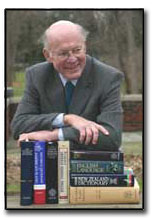
This web page is part of the Michigan Today Archive. To see this story in its original context, click here.
Talking About WordsWith Prof. Richard W. BaileyWhatever!
When I was young and drinking coffee among fellow graduate students, we rehearsed legends about the doctoral defense, the occasion on which the young person faces a last-ditch encounter with her thesis committee. Most of these tales were lurid: senior professors coming to blows over matters of doctrine while the candidate shrank beneath the table; the failed student heading straight for the roof to stand teetering on the parapet until they gave him the PhD. We presumed a high level of formality. In Sweden, these things are done wearing tailcoats, just like the Nobel Prizes, one of my coffee companions said. In Belgium, you sit on a low three-legged stool while the examiners question you from high-backed thrones, affirmed another. In Italy, they appoint the advocatus diaboli (devil's advocate) to tear the examinee to shreds, declared a third. These tales were mostly hooey, and the only solid thing about them was that we were scared. When the time came, the committee called me “Mister” and afterwards “Doctor.” They addressed each other as professor: “Professor Wilson will begin the questioning.” The times, they are a-changin'. Nowadays there are no tail coats or stools or devils. Here's the verbatim opening move by the chair of a doctoral oral examination conducted in the U-M School of Music. “OK, we'll go around the table and we'll, uh, uh, ask questions, make comments—whatever; so Bob, you wanna start, with you?” Disarming? Relaxing? Informal? Or just another case in which the victim shrinks down on the low stool, stares up at the enthroned devils and thinks about the route to the roof? Re-read that well-intentioned opening. Nobody went around the table. Bob did not say, “Yes, Professor Wilson, I very much wanna start with me, thank you very much.” They just got on with the whatever. Whatever is a catchall expression, something like etcetera as that Latin borrowing is used in a mathematical proof to cover the parts that are so simple as not to be worth mentioning. (I nearly failed calculus owing to my inability to grasp an etcetera.) When that music professor said whatever, he intended to encompass comments, questions, abusive remarks, self-aggrandizing sallies, scornful rebukes and so on and so forth. The English language has a long history of whatever expressions. Like etcetera, they encompass sets of words and ideas that are too obvious to mention. Whatever is also used to suggest a vista of semantic possibility that the speaker has only vaguely considered, but he imagines that the use of whatever will sound profound, or at least smart. Here's an example from the wonderful collection of transcripts called the Michigan Corpus of Academic Spoken English or MICASE. (A searchable portion of this collection may be found at http://www.hti.umich.edu/m/micase). “…except everybody has the idea that they're inside and everybody else is inside them, their own, skulls or bodies or, persona or whatever, um, and that in a sense you can't get out and you can't figure out what's going on other places, so there's a basic, basic container metaphor …” This explanation seems to be an especially claustrophobic expression of the mind-body problem. Once again, English is at the ready, prepared to offer whatevers to suit the occasion. Can't remember the name? Whatchamacallit, whatchamacallum, whatchamajigger, whatsisname, whatsername. Have no idea of what it might be? dingbat, dingus, doodad, doohickey, gadget, gimmick, gizmo, widget. The need is not new. Thingumbob appeared first in writing in 1571. Poets find the cracks in the language and play with them, just as water seeps into cracks in a boulder and the frost reduces it to gravel. In “my sweet old etcetera aunt lucy,” e. e. cummings let us fill in the blank made by etcetera with imagination: gray-haired, dotty, kindly for this first one. And he takes us through one etcetera after another right into the mind of a sleeping soldier in the misery of a cold, wet trench. The last etcetera of the poem is so startling that it makes us laugh. The soldier is dreaming about his sweetheart and her etcetera.
|
|
Michigan Today News-e is a monthly electronic publication for alumni and friends. |
| MToday NewsE | |
|
|
Michigan Today
online alumni magazine
University Record
faculty & staff newspaper
MGoBlue
athletics
News Service
U-M news
Photo Services
U-M photography
University of Michigan
gateway

 Richard
W. Bailey is the Fred Newton Scott Collegiate Professor
of English. His most recent book is Rogue Scholar:
The Sinister Life and Celebrated Death of Edward H. Rulloff,
University of Michigan Press, 2003—a biography of an
American thief, impostor, murderer and would-be philologist who
lived from 1821 to 1871. It was published by the
Richard
W. Bailey is the Fred Newton Scott Collegiate Professor
of English. His most recent book is Rogue Scholar:
The Sinister Life and Celebrated Death of Edward H. Rulloff,
University of Michigan Press, 2003—a biography of an
American thief, impostor, murderer and would-be philologist who
lived from 1821 to 1871. It was published by the 